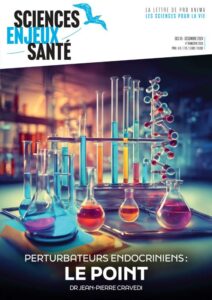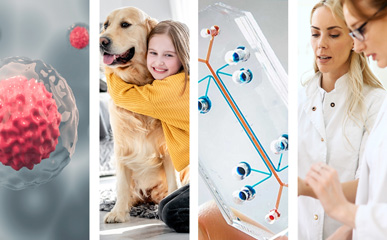
Lab-grown organs to improve clinical trials, Sharing industrial data, long-term in vitro expansion of human fetal pancreas and cerebellar organoids, and more
News on non-animal methods
DECEMBER 09 - 13NEWS, REPORTS & POSITION STATEMENTS
1. How lab-grown organs could improve clinical trials
Dr Pradipta Ghosh, an Indian-born American physician-scientist, biochemist, and cell biologist with expertise in clinical medicine and basic research, is founding director of the Humanoid Centre of Organoid Research, based at the University of California in San Diego.
Dr Ghosh explained to The Royal Gazette that we rely on a lengthy drug discovery process involving approximately $2.5 billion for every drug that fails. She said the process can take a decade to 15 years per drug, with the vast majority of them failing. “The idea that we as scientists cannot reproduce something that beautifully cured the mouse to work in humans is because we are unique, patients are diverse — anything that we discover in caged mice falls apart when it goes to the clinic. […] Now numerous organs can be grown using the organoid technology. That started the era of hope, largely driven by how amazing we can do experiments in 3D, humanlike tissue structures that can continue to be cultured.”
INTERVIEWS, NOMINATIONS & AWARDS
2. Wyss Institute’s iNodes team secures ARPA‑H Award to advance implantable immune organs for ovarian cancer treatment
The Wyss Institute at Harvard University has received an ARPA‑H Sprint for Women’s Health award to advance iNodes, an innovative therapeutic approach using implantable lymphoid organs to treat ovarian cancer. This novel immunotherapy has the potential to significantly improve outcomes for women with advanced ovarian cancer, one of the deadliest forms of female reproductive cancer.
“We have developed implantable formulations of human lymphoid organs that could be injected at the operating table right after tumors are removed or directly inside the tumor if it cannot be removed. ARPA‑H support will tremendously accelerate our technology validation and translation into clinical stages, addressing a critical unmet need for women with ovarian cancer.” — Dr. Girija Goyal, Wyss Institute Senior Scientist.
3. $1.4M DTRA grant to George Mason University scientist to study viruses’ impact on organ health
George Mason University researcher Aarthi Narayanan recently secured a $1.4M grant from the Defense Threat Reduction Agency (DTRA) to investigate how an infection spreads between organs, and how a therapeutic will impact connected organs.
Narayan will utilize CN-Bio’s organ on a chip platform to investigate questions that are directly relevant to human disease caused by these mosquito-transmitted viruses. “This approach will also help us position our therapeutic strategies better and hopefully decrease points of failure down the road, as we strive to come up with rapidly deployable solutions to address the national and global needs for pandemic preparedness,” said Narayanan.
4. Anne Vincent-Salomon, Winner of the Maylis 2024 Prize from the Fondation pour la Recherche Médicale
Created by Sandrine and Bernard Loth, the Maylis Prize supports biomedical research into breast cancer.The 2024 winner,Professor Anne Vincent-Salomon, is a pathologist at the Institut Curie, where she heads the Diagnostic and Theranostic Medicine Unit and the Pathology Department. She is the director of the IHU Cancers des femmes, in Paris.
Her research is aimed at establishing a precise classification of breast cancer subtypes in order to improve diagnosis and prognosis. To this end, she catalogues alterations in cell morphology and molecular anomalies present in different types of breast tumor, and studies their role in the disease. Recently, with her collaborators, she contributed to the development of an AI algorithm allowing to predict specific hereditary genetic abnormalities using breast tumour tissue samples.
Read more (FR)
TOOLS, PLATFORMS, CALLS
5. EUROTOX 2025 : Call for Abstract
The EUROTOX 2025 Congress will take place on 14 – 17 September 2025, in Athens, Greece. The real risks society faces, render necessary an approach that integrates scientific and technological advances, ensuring new technologies do not endanger health or the environment. Toxicology must evolve to address these challenges, developing sustainable solutions for long-term public health. The theme of Eurotox 2025, “Toxicology addresses Society’s real-life risks for sustainable health and well-being,” addresses this need.
You can now register and submit an abstract for poster presentation or short oral communication. Submission is only possible if the participant has registered for the congress in advance. Abstract submission deadline is 31 March 2025.
Read more and submit your abstract
INDUSTRY, BIOTECH & PARTNERSHIPS
6. Orakl Oncology : €11 million to launch first-in-class AI-powered drug development products
Orakl Oncology, a pioneering precision oncology company in France, just announced an €11 million seed funding round, led by Singular, with support from Bpifrance including the Grand Prix i‑Lab, and participation from existing investors.
This new funding will be used to accelerate the company’s growth and support the launch of two new commercial products, O‑Predict and O‑Validate designed to transform the landscape of oncology drug development. O‑Predict, forecasts patient responses to new drug candidates, predicting key clinical outcomes such as the number of responders and progression-free survival. O‑Validate, provides biological evidence of causality, supporting target and biomarker validation and enabling data-based strategic decision-making across drug development stages.
7. “Sharing industrial data”: 6 projects awarded from the Health Data Hub
On November 28, the names of the six winners of the first wave of the “Industrial Data Sharing” Call for Expressions of Interest supported by Roche and MEDIPATH were unveiled.
Since its creation in 2019, the Health Data Hub has been collaborating with private players in its governance and through the projects it supports. To further structure these collaborations, the Health Data Hub has launched, in partnership with Roche and MEDIPATH, a call for expressions of interest from June to September 2024. The aim of this initiative is to multiply the opportunities for using data collected by industry, and to demonstrate the benefits of cross-referencing them with the main database of the Système National des Données de Santé (SNDS) for health research.
SCIENTIFIC DISCOVERIES & PROTOCOLS
8. Development and validation of the Normalized Organoid Growth Rate metric
A new collaborative work with Centre de Recherche en Cancérologie de Marseille (CRCM), the University of Antwerp and Antwerp University Hospital focuses on refining growth-rate-based drug response metrics for patient-derived tumor organoid screening using brightfield live-cell imaging.
This study represents a key step forward in organoid-based drug screening which significantly enhances the ability to differentiate between cytostatic and cytotoxic effects in drug response studies. By integrating advanced label-free image analysis, this work improves the accuracy of drug sensitivity assessments, paving the way for more effective personalized treatment strategies.
9. Long-term in vitro expansion of a human fetal pancreas stem cell
The mammalian pancreas consists of three epithelial compartments : the acini and ducts of the exocrine pancreas and the endocrine islets of Langerhans. Attempts to generate organoids from fetal human pancreatic tissue have had limited success as these have not been cultured long-term, lack acinar cells, and display limited capacity to generate endocrine cells.
A new study describes a human fetal tripotent stem/progenitor cell capable of long-term expansion in vitro and of generating all three pancreatic cell lineages. The authors reported the derivation of 18 human fetal pancreas organoid lines (hfPOs) from gestational weeks 8 – 17 fetal pancreas samples. Single-cell RNA sequencing identifies rare LGR5+ cells in fetal pancreas and in hfPOs as the root of the developmental hierarchy. These LGR5+ cells share multiple markers with adult gastrointestinal tract stem cells. Organoids derived from single LGR5+ organoid-derived cells recapitulate this tripotency in vitro.
10. Generation and long-term culture of human cerebellar organoids
A new research published in Nature Protocols describes the generation and long-term culture of functional human pluripotent stem cell-derived human cerebellar organoids, which successfully replicate the cellular diversity of the fetal cerebellum, along with some distinct cytoarchitectural features.
Unlike other cerebellar organoid models, which initiate differentiation into neurons with single SMAD inhibition and growth of a tail toward a cerebellar fate with FGF2, this protocol relies on dual SMAD inhibition to promote neuralization and WNT and FGF8b for caudalization.


